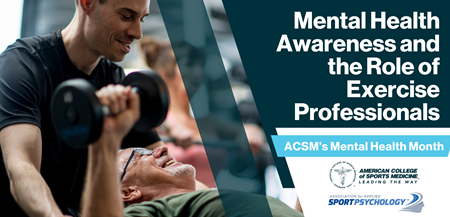Zachary Zenko, Ph.D., and Andrea Lopez, Ph.D., MPH |
May
16, 2022

May is Mental Health Awareness month, which the American Heart Association calls “a time to raise awareness of those living with mental or behavioral health issues and to help reduce the stigma so many experience.” We might increase awareness by letting people know about the National Suicide Prevention Lifeline, which provides around-the-clock emotional support for people in crisis. We might also raise awareness about the Crisis Text Line, which allows people to communicate via text message by texting HOME to 741741.
But we can also raise awareness about our roles as exercise professionals within the complex system of mental health care.
Disparities in Mental Health
Early release of selected estimates from the 2020 National Health Interview Survey indicates that 11.3% of adults regularly had “feelings of worry, nervousness, or anxiety”, and 4.5% of adults experienced “regular feelings of depression.” Overall rates of depression seem to be increasing, and mental and behavioral health issues can affect anyone, although some groups may be affected more than others.
In 2019, according to the Centers for Disease Control and Prevention, women were more likely than men to experience symptoms of depression; moderate depression symptoms were experienced by 4.4% of adults aged 18-29 years, 3.8% of adults 30-44 years, 4.5% of adults aged 45-64 years, and 3.8% of adults 65 years and older. Further, the same data indicate that 19.3% of non-Hispanic Black and non-Hispanic white adults experienced symptoms of depression within the last two weeks, indicating greater prevalence of symptoms of depression within the last two weeks than Hispanic adults and non-Hispanic Asian adults. It is clear, though, that although some groups are more likely to experience symptoms of depression than others, no group is immune.
Mental Health and the COVID-19 Pandemic: Disparate Impact?
Living through the COVID-19 pandemic had an impact on mental health that appears to differ based on race and ethnicity. For example, in a snapshot of time from June 24th to 30th, 2020, 40.8% of Hispanic adults (of any race) reported an anxiety or depressive disorder, which was higher than the rates for “other race or multiple races, non-Hispanic” adults (33.2%), non-Hispanic Black adults (30.2%), non-Hispanic white adults (29.2%), and non-Hispanic Asian adults (18.0%). The pandemic also disproportionately affected the mental health of individuals with low socioeconomic status. The same data suggest that the highest rates of anxiety or depressive disorders were among people with the lowest household incomes. Further, the mental health needs of Black, Hispanic and Asian adults are more likely to be unmet.
The Role of Exercise Professionals
It has been suggested that mental health practitioners have an advocacy role, especially for people at an increased risk of adverse mental health outcomes. What if exercise professionals also share a role in advocacy? Perhaps exercise professionals can also increase awareness of the benefits of a physically active lifestyle. We can raise awareness both for clients and our colleagues in allied health professions.
Exercise has robust effects on mental health, including depression and anxiety. In a recent meta-analysis, Dr. Felipe B. Schuch and colleagues concluded that exercise has a large effect on depression, using both moderate and vigorous intensities and in both supervised and unsupervised settings. Further, exercise has a protective effect against the development of depression and anxiety.
Additionally, we can work to be inclusive, reduce resource barriers to physical activity and develop culturally appropriate programs for clients. The book Physical Activity in Diverse Populations: Evidence and Practice examines how social determinants impact physical activity and provides evidence-based strategies for promoting physical activity.
Conclusion
Given the reliable effects of exercise on mental health outcomes, perhaps it is time to involve exercise professionals more in conversations about mental health, especially as the burden of mental illness increases and people experience pandemic-related stressors. This May, let us continue to increase awareness of life-saving services like the National Suicide Prevention Lifeline and the Crisis Text Line among our clients. Let us also raise awareness about the importance of a physically active lifestyle and the inclusion of exercise professionals for promoting overall health and wellness — which includes improved mental health outcomes and psychological well-being.
Access mental health resources
About the authors:
Dr. Zachary Zenko is an Assistant Professor and the graduate program director in the Department of Kinesiology at California State University, Bakersfield. Dr. Andrea Lopez is an Assistant Professor in Public Health and faculty in the Department of Kinesiology at California State University, Bakersfield.